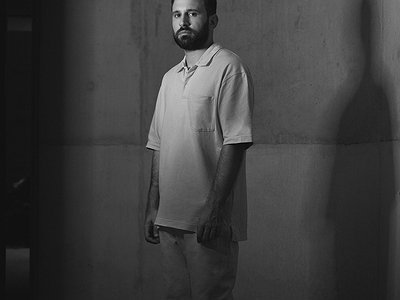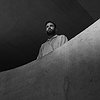Could you take us through a day in your life, from a possible morning routine through to your work? Do you have a fixed schedule? How do music and other aspects of your life feed back into each other - do you separate them or instead try to make them blend seamlessly?
Maybe let’s rewind to before the pandemic, as my routine is quite different now, as it probably is for many more people.
I tried to have as much of a schedule as possible. When not touring, I’d wake up early, go for a walk with my dog, do some exercise, and then take care of my inbox. That would give me a little window of quiet before people started responding to emails, which wasn’t as stressful as waking up late and parachuting into a warzone of unreplied stuff. At lunchtime I’d go to the studio, turn off notifications and do music. If I was feeling inspired, great, but if I wasn’t, I’d accept that, and still commit to the schedule and possibly organize my library, clean up some recordings, organize the studio, fix something. On the weekend I’d very likely have a couple of gigs, so Friday-Sunday would be for travelling.
I would say music is very much intertwined with my personal life. Most friendships I’ve made in the recent past were through work, so it’s often hard to separate both. I wouldn’t know how to work with someone I didn’t have a personal connection with. First, because I treasure what I do too much to ruin it with a toxic environment, and second, because I spend so much time doing it, that work acquaintance and friendship lines blur so often.
Could you describe your creative process on the basis of a piece or album that's particularly dear to you, please? Where did the ideas come from, how were they transformed in your mind, what did you start with and how do you refine these beginnings into the finished work of art?
One of my recent tracks “Luz” was done over the course of a week during lockdown. I started the main riff on my piano, at home, just by noodling around. That’s often how things start for me, I improvise around a mood or theme until something pops out that catches my ear.
Usually when I have a good idea I’ll obsess over it until I have seen it through to the end. As the piano was very emotive and melancholic, I decided to layer it with darker, starker electronic textures. I did the bass and drums dirty and quick, then several layers of processed piano sounds, to somehow bridge the two worlds (natural and artificial) together. I then sent an instrumental draft to Guilherme (GPU Panic) for him to try some vocal ideas on it. No briefing, just a vague idea that it didn’t need any lyrics. He was also inspired by it, and I think you can tell in his vocal performance.
All of the recordings were done at home, they have a very believable sonic imprint (the reverberation of my living room, the creaking noise of the piano stool, some birds outside). It was very important for me to not ruin that feeling of reality and immediacy in the mixing process.
There are many descriptions of the ideal state of mind for being creative. What is it like for you? What supports this ideal state of mind and what are distractions? Are there strategies to enter into this state more easily?
I don’t have a fool-proof strategy, but I think showing up is the most important aspect. Both physically and emotionally, I try to make myself available to create. That, for me, requires making the hours I spend at the studio a priority over anything else. That includes sometimes hiding the phone away and shutting the door to the outside world.
I often get stuck on uninspired periods, and lately I’ve started to realize that changing the context is everything for me: limiting myself to a couple of instruments, writing on a scale or an instrument I’m uncomfortable with, or simply setting random limitations on what to do. That usually triggers creativity for me.
How is playing live and writing music in the studio connected? What do you achieve and draw from each experience personally? How do you see the relationship between improvisation and composition in this regard?
I would extend this idea to three vertices: DJing by myself, playing live with my band, and working in the studio. They all communicate and inform each other. I often try out my music on DJ sets before it’s fully finished, and oftentimes the way I perceive it in that context (between other songs and in front of an audience) makes me see the piece itself in a different way, which will guide my decisions in the studio. Same for trying a new composition live with other musicians: sometimes there are mistakes or left turns, and they can be even more interesting than the original idea, so I keep my little world open to this beautiful form of contamination.
How do you see the relationship between the 'sound' aspects of music and the 'composition' aspects? How do you work with sound and timbre to meet certain production ideas and in which way can certain sounds already take on compositional qualities?
I'm very textural in the way I perceive music. There's a high level (rational) response to complex ideas and concepts, but the true emotional response is in the details. Much like in a work of fiction, it's the small details that make up the characters who "sell you" that fiction.
I see details in music the same way, they create a convincing sonic narrative. Obviously, unorganized textures are just noise. So layering and shaping them is an important task - as important as the raw materials themselves.
Our sense of hearing shares intriguing connections to other senses. From your experience, what are some of the most inspiring overlaps between different senses - and what do they tell us about the way our senses work? What happens to sound at its outermost borders?
I think that olfaction is underrated. Some smells are able to throw me back in time to a fond memory, like jasmine trees flowering on summer nights. That’s the closest I get to experiencing synesthesia, as a sudden smell subtly shifts my perception of sound and color around me. Many people in my life have an olfactory signature, be it through natural scent or perfume, and I easily associate their smell with a particular musical mood or motif.
Visual ideas often come to me last, after all other senses have already contributed to creating an idea.
Art can be a purpose in its own right, but it can also directly feed back into everyday life, take on a social and political role and lead to more engagement. Can you describe your approach to art and being an artist?
If there is a purpose in art, then it surely must be connected to everyday life. My personal work spans from a desire to make sense of the world, and also to try and impact it in a positive way. To leave the proverbial mark!
Creation, like parenthood, is perhaps connected to our desire to escape death, so I see someone’s body of work as descendancy. The DNA of a 1960’s record by Stan Getz is present in J Dilla’s records, be it literally by sampling or figuratively, by influence. Stan Getz’s music has Bossa Nova and Samba DNA all over, which in turn has Afro-Latin origins, namely the intertwining of indigenous brazilian cultures, african cultures from slaves brought to South America, European music tradition brought in by colonizers. So my role in this, albeit small, is shaping these inputs into new outputs.
This role has responsibilities and consequences. The way we see the world shapes everything we do, from the economy to music, so, for me, no art is apolitical. I acknowledge all the people before me that allowed me to do what I do, and I am indebted to them. I have a responsibility to create as many conditions as possible for those that will follow me. And, most importantly, I want to help shape the world into a place that is safer, kinder, more dignifying, and more equal for all of us.
It is remarkable, in a way, that we have arrived in the 21st century with the basic concept of music still intact. Do you have a vision of music, an idea of what music could be beyond its current form?
I think, in its essence, music will remain the same. There’s a ritualistic, communal experience at its core. Why are we all missing music events? We’ve all experienced this concept of “belonging” to something bigger than ourselves on a dance floor. It’s a very beautiful form of non-verbal communication. So, as long as it will be made by humans and for humans, its core will remain the same, even if the textures change.
I do speculate often on us reaching a General Artificial Intelligence, a fully sentient life form capable of creating, and how will this art be perceived by us humans. One can argue that music and art in general is our way of experiencing the sublime, so why would their sublime be intersected with our sublime?



